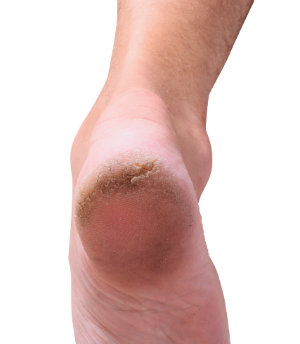 The medical condition known as cracked heels, is an ailment many patients suffer from. The symptoms that are most often associated with cracked heels can include skin that is dry and thick on the outside of the heels and deep cracks or fissures in that area. Diabetic patients may experience cracked heels as a result of a loss of feeling which may accompany this condition. This can possibly lead to bleeding and an infection. Some of the reasons cracked heels may develop can include being overweight, standing for extended periods of time throughout the day, or from wearing shoes that have an open back. Mild relief may be obtained when the feet are soaked in warm water, followed by frequently using a good moisturizer. If you have this condition, and it is causing pain and discomfort, it is suggested that you consult with a podiatrist who can recommend proper treatment options.
The medical condition known as cracked heels, is an ailment many patients suffer from. The symptoms that are most often associated with cracked heels can include skin that is dry and thick on the outside of the heels and deep cracks or fissures in that area. Diabetic patients may experience cracked heels as a result of a loss of feeling which may accompany this condition. This can possibly lead to bleeding and an infection. Some of the reasons cracked heels may develop can include being overweight, standing for extended periods of time throughout the day, or from wearing shoes that have an open back. Mild relief may be obtained when the feet are soaked in warm water, followed by frequently using a good moisturizer. If you have this condition, and it is causing pain and discomfort, it is suggested that you consult with a podiatrist who can recommend proper treatment options.
Cracked heels are unsightly and can cause further damage to your shoes and feet. If you have any concerns, contact Dr. Derek T. Pantiel from Summit Podiatry. Our doctor can provide the care you need to keep you pain-free and on your feet.
Cracked Heels
Cracked heels appear unappealing and can make it harder for you walk around in sandals. Aside from looking unpleasant, cracked heels can also tear stockings, socks, and wear out your shoes. There are several methods to help restore a cracked heel and prevent further damage.
How Do You Get Them?
Dry skin is the number one culprit in creating cracked heels. Many athletes, walkers, joggers, and even swimmers suffer from cracked heels. Age and skin oil production play a role to getting cracked heels as well.
Promote Healing
Over the counter medicines can help, especially for those that need instant relief or who suffer from chronic dry feet.
Wear Socks – Wearing socks with medicated creams helps lock in moisture.
Moisturizers – Applying both day and night will help alleviate dryness which causes cracking.
Pumice Stones – These exfoliate and remove dead skin, which allows for smoother moisturizer application and better absorption into the skin.
Change in Diet
Eating healthy with a well-balanced diet will give the skin a fresh and radiant look. Your body responds to the kinds of food you ingest. Omega-3 fatty acids and zinc supplements can also revitalize skin tissue.
Most importantly, seek professional help if unsure how to proceed in treating cracked heels. A podiatrist will help you with any questions or information needed.
If you have any questions, please feel free to contact one of our offices located in Wilmington, Whiteville, and Burgaw, NC . We offer the newest diagnostic and treatment technologies for all your foot care needs.
Read more about Solutions for Cracked Heels